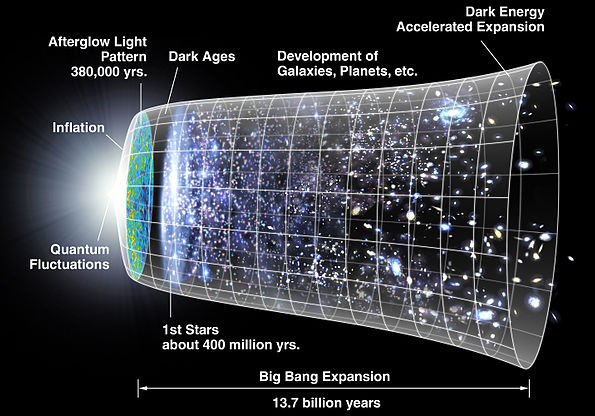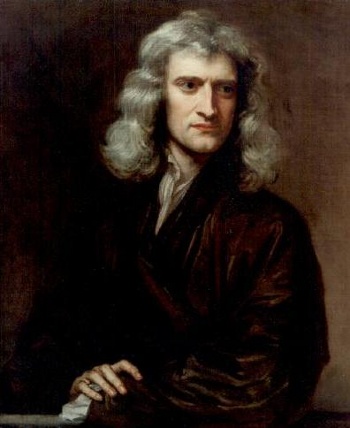Newton's Chronology
March 6, 2013
One part of the study of
history that no student likes is memorization of dates.
My generation was forced to memorize such important dates as 1066 (the
Battle of Hastings), 1215 (the
Magna Carta), 1776 (The
United States Declaration of Independence), and 1863 (the
Emancipation Proclamation). As I mentioned in a
previous article, I didn't know the year of my birth when I was in
fifth grade, and I suspect that writing it incorrectly on an
IQ test may have inflated my score.
Subsequent history
educators have instead opted for a "
past as prologue" approach in which the sequence of events, rather than their absolute timing, is what's important. Now, we have timelines in which the
assassination of
Archduke Franz Ferdinand of Austria should come before
World War I.

Now, that's a timeline! This is the history of the universe, as determined by the Wilkinson Microwave Anisotropy Probe. (NASA/WMAP Science Team image, via Wikimedia Commons.)
My
high school world history course, taught in 1963, barely mentioned
World War II, which had ended nearly twenty years before, and the coincident founding of the
United Nations. This was either an early example of
political correctness; or, it was just laziness on the part of the
textbook publishers. It was likely a little of both.
Our obsession with dates is fairly recent. As we entered the
new year, we once again read those many articles about what the
real date of
Christmas should be. The only
written records are references to the reign of certain
potentates. Some
astronomers think it might be
near the time of a
conjunction of the planets,
Jupiter and
Saturn, in 7
BC. When we go more than a thousand years further back than this, to the time of the
Trojan War, things are fuzzier, still.
In an impressive show of
scholarship,
Archbishop James Ussher added up all the dates in the
Bible in 1650 to produce
his chronology that placed the beginning of the world in 4004 BC.
Scientists won't argue with the claim that
4004 was the start of the
personal computer revolution; but, as the above illustration shows, they do say that the
universe is
somewhat older.
Isaac Newton was a preeminent
physicist, but he was also a child of his time. It's said that he wasn't just one of the most influential scientists who ever lived, but also
the last mystic. There's a book about him entitled, "Isaac Newton: The Last Sorcerer."[1] Since we've just passed the
end of the world according to the Mayan Calendar, it's interesting to note that Newton had
his own end of the world prediction, which was 2060.

A 1689 portrait of Isaac Newton by Godfrey Kneller (1646-1723).
(Image from Robert Harry van Gent, "Source Webpages on the History of Astronomy,"
via Wikimedia Commons.)
In 1728, Newton's world
chronology, "
The Chronology of Ancient Kingdoms," was published. As an author who struggled to write 80,000 words in each of my two
novels, I'm quite impressed that this chronology runs to 87,000 words. The chronology was published after his death, but not because he was worried about the consequences of publication. He had actually hastened to complete it to establish his
priority in the matter. Newton's chronology is reviewed with an emphasis on its
astronomical references in an arXiv posting by
Yaël Nazé of the
Université de Liège.[2]
Newton's motivation, as stated in the chronology, was that "history without chronology is confused."[2] It was hard, especially in Newton's time, to date anything without a written reference. The earliest recorded date he could verify was a reference to an
Egyptian Pharaoh, possibly
Ramesses IX, in 1125 BC, which is about a hundred years after the Trojan War. Astronomical events, as mentioned above in the context of Christmas, are easy for astronomers to date. In his chronology, Newton makes use of an astronomical phenomenon, the
precession of the equinoxes, to date world events.
This precession is an
angular shift of the
solstice points among the
stars. The magnitude of precession is actually quite large, amounting to a degree every 72 years. Comparing historical records of this with the observations at Newton's time gives a very accurate method of dating; for example,
Hesiod writes about
Arcturus rising at
sunset sixty days after the
winter solstice.[2] Newton was interested in chronology, since he believed that the estimates of the age of
civilization up to his time, 4000 and 5200 years, were too large. In Newton's
philosophy, this period was also the time since
creation.
Newton desired a shorter duration, since those estimates meant that the world had passed the time of the
prophesied Apocalypse. Newton wanted to put this Apocalypse into the future, and thus arose his chronology and the 2060 date. One interesting argument that Newton makes involves the dating of the aforementioned Trojan War.
The tale of
Jason and the
Argonauts contains the names of the
constellations, and none of these refer to the Trojan War. Newton argues that the constellations must have been named before the war, since a major event such as that would surely have been commemorated by a constellation, or two, if there were still room left in the sky.
Newton didn't rely just on
scripture for source material, as Archbishop Ussher did a few decades earlier. Newton used the available
classical literature, which included the works of
Herodotus, Hesiod,
Homer,
Pliny,
Plutarch, and many others. In some sense, we can say that
Immanuel Velikovsky applied Newton's technique in his writing of
Worlds in Collision.
One interesting portion of Newton's chronology is his association of
Atlantis with the island of
Ogygia, chronicled in Homer's
Odyssey. I wrote about Atlantis and its possible association with the island,
Santorini (a.k.a., Thera), in a
previous article (Science and the Atlantis Myth, May 18, 2012). Newton calculated that Odysseus left this island in 876 BC, which is more than three hundred years after the presently acknowledged date of the Trojan War, with which Odysseus is connected. Newton recalls from his sources that Atlantis had been as large as
Europe,
Africa and
Asia, combined, and it sank into the
sea.
In the end, Newton's arguments shortened the timeline of civilization by about five
centuries, giving an earliest date of 1125 BC.[2] This is more recent than our current understanding of the date for the Trojan War, about 1250 BC. These five centuries were enough to push the Apocalypse from just before Newton's time to 2060.
Computer people know that the real Apocalypse will happen at 03:14:08
UTC on January 19, 2038. That's when the
32-bit Unix time stamp will reset to zero.
References:
- Michael White, "Isaac Newton: The Last Sorcerer," Basic Books, April 6, 1999, 416 pages (via Amazon).
- Yaël Nazé, "Astronomical arguments in Newton's Chronology," arXiv Preprint Server, December 20, 2012.
- Isaac Newton, "The Chronology of Ancient Kingdoms" (Project Gutenberg).
Permanent Link to this article
Linked Keywords: History; baby boomer; Battle of Hastings; Magna Carta; United States Declaration of Independence; Emancipation Proclamation; fifth grade; intelligence quotient; IQ test; educator; what's past is prologue; assassination; Archduke Franz Ferdinand of Austria; World War I; universe; Wilkinson Microwave Anisotropy Probe; NASA/WMAP Science Team; Wikimedia Commons; high school; comparative history; world history; World War II; United Nations; political correctness; textbook; publisher; New Year; Christmas; recorded history; written record; potentate; astronomer; Star of Bethlehem; conjunction; Jupiter; Saturn; Anno Domini; BC; Trojan War; scholarly method; scholarship; Archbishop James Ussher; Bible; Ussher chronology; Scientist; Intel 4004; personal computer; universe; Isaac Newton; physicist; mystic; end of the world according to the Mayan Calendar; Godfrey Kneller (1646-1723); Source Webpages on the History of Astronomy; chronology; The Chronology of Ancient Kingdoms; novel; scientific priority; astronomy; astronomical; Yaël Nazé; Université de Liège; Egypt; Egyptian; Pharaoh; Ramesses IX; precession of the equinoxes; angle; angular; solstice; star; Hesiod; Arcturus; sunset; winter solstice; civilization; philosophy; Genesis creation narrative; prophecy; prophesied; Apocalypse; Jason; Argonauts; constellation; scripture; classics; classical literature; Herodotus; Homer; Pliny the Elder; Plutarch; Immanuel Velikovsky; Worlds in Collision; Atlantis; Ogygia; Odyssey; Santorini; Thera; Europe; Africa; Asia; Atlantic Ocean; sea; century; system administrator; computer people; Coordinated Universal Time; UTC; 32-bit; Unix time stamp; Michael White; Isaac Newton: The Last Sorcerer; The Chronology of Ancient Kingdoms.